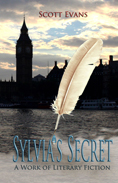"Is that you, Mister Hughes? I should have expected you to show up eventually. Is that your hand on my shoulder?"

 |
Sylvia's Secret: A Work of Literary Fiction by Scott Evans Port Yonder Press
book review by Susan J. Illis
Academic and poet Cassandra Johnson, in England on a Fulbright to study Sylvia Plath, believes she has unearthed proof that Plath was actually murdered, not driven to suicide, by her husband Ted Hughes. However, the death of Cassandra's ex-boyfriend in a hit-and run accident and her unshakable belief that somebody has been following her, convince her that her life in in danger.
Back in the states, her colleague Joseph Conrad is denied tenure, despite his publishing record and donation of priceless Shakespeare manuscripts to the school's library. His bad day gets much worse when he returns home early to find his wife Sara in bed with another man. An e-mail from Cassandra, begging for help, provides him the excuse to escape his public embarrassment and personal humiliation.
Conrad is immediately drawn into Cassandra's research, and London in snowy December is an enchanting place to be. Resisting Cassandra's considerable charms when he is so vulnerable proves increasingly difficult, despite her disturbing, erratic behavior.
As easy as it is to mistrust a work that proclaims itself literary fiction, Evans' work is well-researched, well-written, and lives up to its description as a literary mystery. Sylvia's Secret is the third in a series, and reading the first two entries might clear up some references to past events, but it is not necessary. The setting is as important as the characters, and might turn any reader into a burgeoning anglophile. Conrad's and Cassandra's characters are exquisitely developed, and Cassandra draws the reader into her own spiraling madness. Some readers may be disappointed by the resolution of the mystery, although any other solution would have been implausible. Indeed, the novel's main fault may be the ease with which it allows the more skeptical reader to be dubious of Cassandra's claim.
RECOMMENDED by the US Review